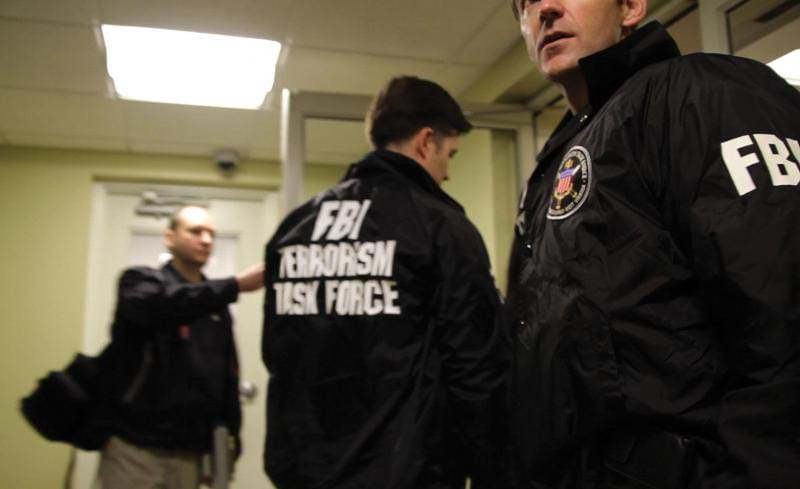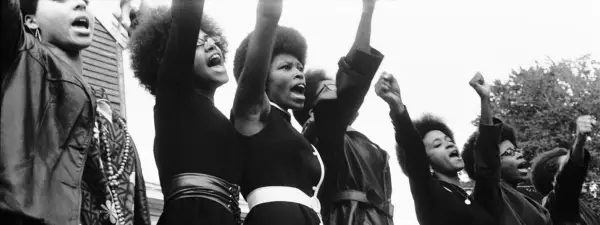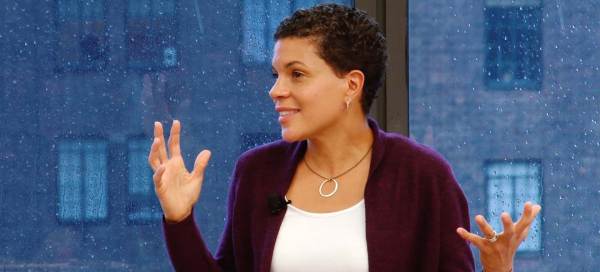
Directed by Lyric Cabral and David Felix Sutcliffe (and supported by Ford Foundation JustFilms through our partnership with the Sundance Institute), (T)ERROR follows undercover FBI informant and former Black Panther Saeed “Shariff” Torres as he tries to earn the confidence of a suspected jihadist. It’s the first film to document a covert terrorism sting in real time. (T)ERROR puts a human face on this risky work while asking what rights we’re willing to sacrifice in the fight against terrorism. It also highlights the tension between Torres’s past as a “revolutionary patriot” and his current role in the war on terror.
With unique insights into issues of privacy, public safety, and discrimination against the black and Muslim American communities, (T)ERROR is sobering, gripping, and timely. Winner of a 2015 Sundance Film Festival Special Jury Prize, the documentary airs on PBS on February 22 and will be available for free streaming on PBS.org for one week after that. To mark the film’s television premier, I asked filmmakers Cabral and Sutcliffe about the provocative issues their film raises and how they resonate beyond the screen.
Chi-hui Yang: (T)ERROR looks at the complex intersection of a number of subjects: black communities, Muslim American communities, FBI surveillance programs, and national security. Why was it important for you to make this film now?
Lyric Cabral and David Felix Sutcliffe: Today, there is widespread acknowledgment the war on drugs was a failure. The declared objective—battling drug abuse—was undoubtedly a noble one. The tactics, as Michelle Alexander has brilliantly pointed out in The New Jim Crow, were anything but. Like the war on drugs, the war on terror has also proved to be a failure. Though founded upon similarly noble intentions, the war on terror has not only been ineffective at combating global terrorism, it seems to have made the problem worse. Once a ragtag band of fighters, Al Qaeda is now a worldwide franchise. ISIS currently controls huge patches of Iraq and Syria, and has been notoriously successful at attracting recruits from around the world.
But wars require public support. And despite the myriad failures of the war on terror, many Americans remain widely supportive. For this reason, we felt compelled to make a film that could address a key component of that support: the FBI informant program.
Since 2009, paid FBI informants have played a central role in nearly 50 percent of all domestic terrorism cases. Informants, who can earn more than $100,000 per case, are directed to build relationships with persons of interest. The persons of interest, or targets, are predominantly Muslim, often mentally ill, and economically desperate. Informants use a mixture of persuasion, coercion and financial incentives to induce targets to participate in imaginary terrorist plots where all the means, motives, and materials are provided by the government. Announced at regular intervals, these cases help to reinforce the ever-present, local threat of terrorism in the public imagination. And just as the myth of the black male “superpredator” was used to justify the government’s expansion of power in the war on drugs, these tactics are predicated upon a new villain: the Muslim terrorist.
Twice as many people have been killed since 9/11 by right-wing extremists and anti-government fanatics than by radical Muslims. Yet the FBI informant program has almost exclusively targeted Muslim American communities. In response to the FBI’s aggressive targeting of Muslim communities, parents are telling their children not to dress in religious garb and Muslim student groups have posted signs advising members to “please refrain from political conversations.” Fearing informants, mosque goers are often wary of interacting with new members of the community, preventing relationship building within sacred spaces of worship.
And just as the primary victims of the war on drugs—black men, along with their families and communities—have yet to receive adequate treatment for their wounds, our society has yet to acknowledge the injuries being sustained by Muslim Americans in the war on terror. At a time when anti-Muslim violence has tripled, we must investigate the ways policies have contributed to this environment, and how they continue to endanger the lives of millions of Muslims in America. While the United States faces serious threats to its national security, the violation of rights—and the cost of employing racist tactics that do little to curb terrorism and more to provoke it—should be of concern to all Americans.
CY: (T)ERROR is not only about surveillance today. With a main subject who is a former member of the Black Panthers—a group that was heavily surveilled by the FBI in the ’60s and ’70s—the US government’s long history of tracking dissident and activist groups serves as the backdrop. What role does that history play in the film?
LC & DFS: Through an exploration of our main character, Saeed, his personal narrative, and the political geography in which it is situated, we hope to present audiences with a meaningful perspective of his current circumstances and the tragedy that it represents. That tragedy is simply this: The Black Panthers, Saeed’s former community, was destroyed by informants and FBI abuses. Now he is an FBI informant, whose actions are tearing at the social fabric of another community he wants desperately to belong to, and have prevented him from doing so. As Saeed says near the film’s conclusion, “I’m a Muslim, and I can’t even go to the mosque.”
It is also critical for audiences to understand that this story, and this surveillance, exists as part of a continuum. Social monitoring is but one of many tools wielded by authorities to restrict and repress voices they deem dangerous. The Black Panthers’ ten-point platform was not a violent manifesto—it was a sane and urgent plea for justice, and for a radical redistribution of rights and power. When we look back at history through this lens—whether at the FBI’s persecution of the Black Panthers, or Senator McCarthy’s attempts to identify and scapegoat Communists—it is clear that these efforts stem not from a commitment to providing security, but to protecting supremacy.
Today, these tactics are also being used against environmentalists and anti-war activists. And there are new reports that the Department of Homeland Security is monitoring the Black Lives Matter movement. If nothing else, we hope that this film and the history it references will inspire Americans to consider the terrifying implications of this surveillance, and the danger it poses to one of our country’s most valuable national resources—the free voice of the people.
CY: The intricate triangle you document between the FBI, an informant, and a surveilled subject is one that doesn’t make for quick summary. In fact, you seem more interested in raising questions than providing answers, and in this way, produce a fascinating, engaged experience for the viewer. When we think about films that make change and reveal truths, what is the role of surfacing complex questions that might not have clear answers?
LC & DFS: We have each arrived at definite, though not identical, positions regarding the issues addressed in our film. Our individual perspectives on these issues are the culmination of nearly a decade of researching, reporting, and questioning. We have also developed intimate relationships with individuals, families, and communities targeted by government surveillance, and have borne witness to the traumatizing consequence of that surveillance. These experiences, informed by our efforts to understand the social and political context surrounding them, have contributed to the shaping of our own ideas and thoughts about national security policy, and the need for change.
But it is impossible to condense ten years of experience and research into an 84-minute documentary. And so in crafting (T)ERROR, we decided it would be best to present viewers with questions rather than conclusions, so they could perform their own investigations. We can’t force audiences to see our respective “truths.” But we can present them with a glimpse of the individuals and experiences that have helped shaped them. By doing so, we hope to offset the vacuum of information that has accompanied the war on terror, and to contribute substance and complexity to a debate which desperately needs it.
CY: Lyric, you’re a trained photojournalist. David, you come from a documentary tradition. You’ve described (T)ERROR as a work of both journalism and documentary filmmaking. How have your different approaches to storytelling influenced the project, and your collaboration?
LC & DFS: Both of us had spent several years working on projects that explored national security, primarily from the perspective of Muslim American families who were negatively impacted by our country’s policies. Lyric’s journalism background helped anchor the film’s investigation of Saeed’s work as an informant, and the process by which he set out to “catch” terrorists. David’s initial interest in the issue was a combination of political outrage and psychological curiosity. In addition to establishing the ethical and moral dilemmas of the FBI’s informant program, he wanted to examine the interiors of Saeed’s double-life and dual-consciousness, as well as the mental maneuvering required to suppress his feelings of guilt or remorse. Gradually, our respective concerns and interests became interwoven in the telling of Saeed’s story, and they ultimately worked together to enhance both the political and emotional dimensions of the film.
CY: (T)ERROR has won a number of awards, including a Special Jury Prize at the 2015 Sundance Film Festival, where it made its world premiere. As independent filmmakers whose feature documentary has gotten national attention, what is your view of the current conversations about the lack of diversity in Hollywood, and at the Oscars?
LC & DFS: We are profoundly grateful for the success we’ve experienced with (T)ERROR. It has afforded us the opportunity to travel to film festivals around the country and the world. For both of us, this has been our first experience spending a substantive amount of time interacting with the filmmaker community. As much as we’ve enjoyed being invited into that community, it is deeply upsetting how overwhelmingly white, and overwhelmingly male, this community is. A recent article by Esther Robinson in Filmmaker Magazine reported that white males directed 82.4 percent of films in the Director Guild of America’s inaugural Feature Film diversity report. As Robinson points out, “Sometimes you don’t need data; you just need eyes.”
While traveling on the festival circuit, we’ve had conversations with other filmmakers, and also funders, about this issue—but not nearly enough. In white spaces, the concerns are also chiefly white. In other words, the absence of filmmakers of color (or funders, programmers, publicists, agents, writers of color…) is addressed barely, if at all. Yes, talking about race is difficult. It’s especially difficult for white folks whose racial literacy skills have been untested, and are thus underdeveloped. Add in unconscious bias, a lack of information, knowledge, or interest (or sometimes all three) in examining white privilege, and the result is: well, 82.4 percent of films being directed by white males.
As Ava DuVernay said recently, the word “diversity” has limits: It points toward a two-dimensional solution for a complex issue, implying that there is a quota which, when satisfied, will eradicate the “problem” of race. Rather than address discrimination and inequality as merely a quantitative issue, we think it’s important to approach it as a qualitative one as well. Specifically, how can we make the filmmaking community not just more diverse, but more inclusive? Opening the door so that this community more closely resembles the society in which it is situated is just the first step of a long and necessary process. Once people of color receive funding, or are accepted into festivals, or are invited to participate on panels, or to write for magazine X, or review and recommend proposals for foundation Y… After all of that has been achieved, how can we ensure that people of color feel safe, respected, and supported? Not only to do the best work possible, but also to voice their concerns if they feel the room is still stained by bias?
Though the roots of racism—as well as sexism, classism, and all other forms of discrimination—may be far-flung and buried deep, it is the responsibility of all of us, especially those with privilege, to examine and use our individual power to dig up and eradicate them.
Watch the trailer:
Accessibility Statement
- All videos produced by the Ford Foundation since 2020 include captions and downloadable transcripts. For videos where visuals require additional understanding, we offer audio-described versions.
- We are continuing to make videos produced prior to 2020 accessible.
- Videos from third-party sources (those not produced by the Ford Foundation) may not have captions, accessible transcripts, or audio descriptions.
- To improve accessibility beyond our site, we’ve created a free video accessibility WordPress plug-in.


